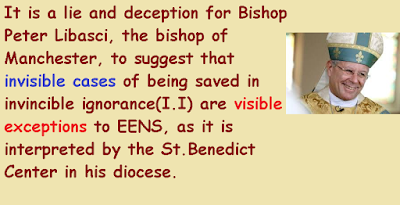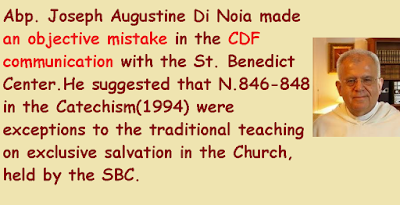Comment
"Outside the Church there is no salvation"
846 How are we to understand this affirmation, often repeated by the Church Fathers?335 Re-formulated positively, it means that all salvation comes from Christ the Head through the Church which is his Body:
- Basing itself on Scripture and Tradition, the Council teaches that the Church, a pilgrim now on earth, is necessary for salvation: the one Christ is the mediator and the way of salvation; he is present to us in his body which is the Church. He himself explicitly asserted the necessity of faith and Baptism, and thereby affirmed at the same time the necessity of the Church which men enter through Baptism as through a door. Hence they could not be saved who, knowing that the Catholic Church was founded as necessary by God through Christ, would refuse either to enter it or to remain in it.336
CCC 846 Reformulation of dogma is what Domino Jesus prohibits: It would be contrary to the faith to consider the Church as one way of salvation alongside those constituted by the other religions.
Lionel:
Even with this re-formulation the Catechism of the Catholic Church N.846 does not contradict the strict interpretation of the dogma extra ecclesiam nulla salus (EENS).
So even though all salvation comes from Christ through the Church which is his Body all need faith and baptism for salvation(Ad Gentes 7, Vatican Council II). All.
He himself explicitly asserted the necessity of faith and
Baptism, and thereby affirmed at the same time the necessity of the
Church which men enter through Baptism as through a door. 336 LG 14; cf. Mk 16:16; Jn 3:5.
Brother Andre Marie MICM in his Letter on Docrine posted on the St.Benedict Center website has stated that we personally cannot know of any exception to the dogma extra ecclesiam nulla salus (EENS). We personally cannot judge if someone will be saved in invincible ignorance outside the Church. This would only be known to God if it happens.
So the following passage in CCC 846 and also Lumen Gentium 14 is not an exception to the strict interpretation of EENS. It is irrelevant to the dogma EENS as it was interpreted for example, by the Magisterium of the 16th century.-Lionel Andrades
Hence they
could not be saved who, knowing that the Catholic Church was founded as
necessary by God through Christ, would refuse either to enter it or to
remain in it.
-Lionel Andrades
-Lionel Andrades




































